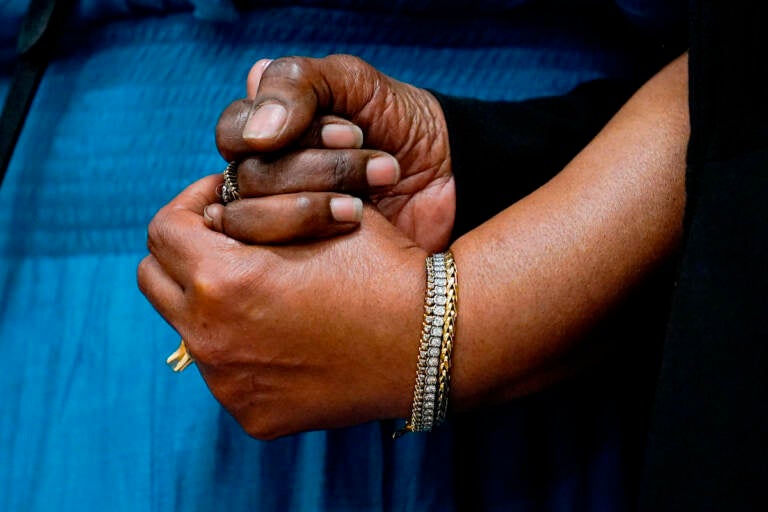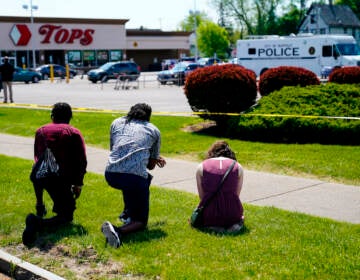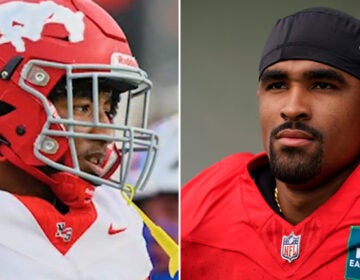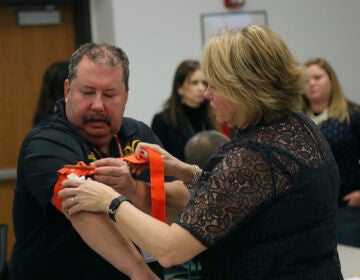After Buffalo shooting, mental health professionals advise taking a break from the news. For Black Americans, that’s easier said than done
The exposure to racist acts of gun violence is a mental health concern, local mental health professionals say.

The daughters of Ruth Whitfield, a victim of shooting at a supermarket, Angela Crawley (left) and Robin Harris, hold hands during a news conference in Buffalo, N.Y., Monday, May 16, 2022. (AP Photo/Matt Rourke)
Experiencing forms of racial violence is a burden that many Black Americans carry over generations. Last week’s shooting at a grocery store in Buffalo, New York, is the latest example.
For clinical psychologist Dr. Ariane Thomas, explaining this racist mass shooting to her 12-year-old son conjures past feelings of frustration.
“I want him to be able to have some freedom and lightness and joy,” said Thomas, who is also a lecturer at the University of Pennsylvania. “And yet, I have to have more conversations that I should never have to have with him about realities he should never have to face.”
Thomas has been a psychologist for nearly a decade. She’s worked with individuals dealing with anxiety and depression, relationship building, and racial identity development. She recalls one of the first conversations she had with her son about being a young, Black man in America.
“It was specifically Trayvon Martin,” Thomas said. “I remember breaking down into absolute sobs with a sense of indignation and frustration that I had to even have these conversations with my very young elementary school child.”
For many Black people, it feels like the violence against communities of color will never stop. There have been 203 mass shootings this year in the United States, reported as of May 17, 2022, according to the Gun Violence Archive. This year, the U.S. has so far seen a total of 16,222 deaths as a result of gun violence. In 2020, there were 19,411 deaths.
“It all feels just all too familiar and. It’s gotten to the point where the familiarity is … I’m less emotionally volatile, I guess,” Thomas said.
Exposure to racist acts of gun violence is also a mental health concern. For many people in Black communities, trying to cope with feelings of fear, anger, or anxiety, finding mental health needs is a challenge.
Psychiatrist Dr. Ankur Desai, a medical director for AmeriHealth Caritas’ behavioral health business in New Jersey, said that even though most people are not directly harmed from acts of gun violence, listening and watching about them are a form of “vicarious trauma.”
“You’re actually traumatized from just the images hearing about it,” Desai said. “And then you end up doing more research or reading about — the kind of the events that led up to the tragedy and kind of the sequelae that happen after the tragedy.”
Desai said that there has been an increased awareness of mental health needs as a result of these incidents. He also said that it’s helpful to take breaks from news and social media to avoid constant exposure to traumatic images.
“I try to encourage people just practically to keep it simple,” he said. “To give themselves either a morning time or an evening time to kind of catch up on the day’s events, but to try to stay away from having it on continuously or accessing it continuously,” he added.
Thomas also encourages her clients to manage their time on social media and to view the news less often. She believes that for Black people, it’s important to understand that taking space to not worry about the risks for black communities is healthy.
But even as a mental health professional, Thomas faces a difficult dilemma when limiting herself from staying informed — she is still a Black mother. And as a Black mother, knowing about acts of racial violence is what helps her protect her son.
“It makes me angry every single time. And yet I have to do it. Because if I don’t do it, then I’m sending him out into the world unprepared,” she said.
___
Support for WHYY’s coverage of health equity issues comes from the Commonwealth Fund.
WHYY is your source for fact-based, in-depth journalism and information. As a nonprofit organization, we rely on financial support from readers like you. Please give today.








